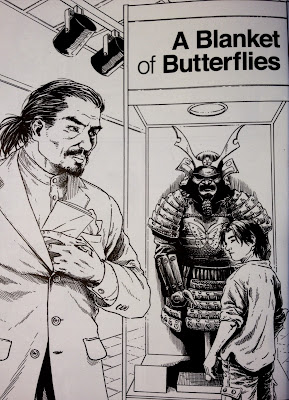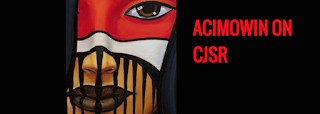new posts in all blogs
Viewing: Blog Posts Tagged with: Richard Van Camp, Most Recent at Top [Help]
Results 1 - 13 of 13
How to use this Page
You are viewing the most recent posts tagged with the words: Richard Van Camp in the JacketFlap blog reader. What is a tag? Think of a tag as a keyword or category label. Tags can both help you find posts on JacketFlap.com as well as provide an easy way for you to "remember" and classify posts for later recall. Try adding a tag yourself by clicking "Add a tag" below a post's header. Scroll down through the list of Recent Posts in the left column and click on a post title that sounds interesting. You can view all posts from a specific blog by clicking the Blog name in the right column, or you can click a 'More Posts from this Blog' link in any individual post.
If you follow Native news, you know that suicide rates in our communities are high. Here's a table from a 2015 report by the Center for Disease Control:
That is data for the U.S. If you do an internet search, you'll find news stories about youth suicides in Canada.
Richard Van Camp's
Spirit is--as he said in a tweet in September of 2016--a suicide prevention comic book.
It opens with a mom, shucking corn. Nearby, a baby is sleeping. That baby's spirit rises from its body, and flies out the window, and over several pages, we see the baby fly over a Native community of kids and elders. She flies to a house where, inside, a young man in tears is reaching for pills. He looks up, surprised to see her, and drops the pills, and holds her to him. On the next page, we see people gathered round a table, praying. The door opens, and in walks the young man. They call out "Surprise!" together. They're having a feast for him, because they know he's having a rough time. His grandfather gives him some snowshoes and talks about going to their cabin. His grandmother tells him a story about his birth.
His Native family and community, in short, have gathered to help him. With its Native content, it is a powerful message about Native community. While it is crucial that teachers and librarians have books like
Spirit in their collections, it is also important to remember that--unless you've got training to work with someone who is contemplating suicide--you may not be the right person to help.
Spirit is published by the
South Slave Divisional Education Council, which serves several First Nations communities. It is available in several different First Nations languages. I've written to Richard to ask where people can buy it. As soon as I hear back, I'll add that information, here.
In the last month or so I've been using the phrase "being loved by words" or "being loved by a book." I don't know if that works or not. Some might think it sounds goofy. It does, however, capture how I felt, reading the stories in Love Beyond Body, Space, and Time: An LGBT and Two Spirit Science Fiction Anthology. It is definitely a book I recommend to young adults.
The emotions it brought forth in me are spilling over again and again, of late. I don't know what to make of that tenderness that I feel, but it is real.
Around the same time that I read the anthology, I got an electronic copy of We Sang You Home by Richard Van Camp and Julie Flett. I had that same response to it. Indeed, there were moments when I was blinking back tears! Now, I've got a copy:

I've thought about it a lot since first reading it, trying to put words to emotions. Richard Van Camp and Julie Flett are Native. I've read many of their books and recommend them over and over. Working together on this one (their first one is
Little You), or apart, the books they give us are the mirrors that Native children need.
Just look at the joy and the smile of the child on the cover! That kid is loved, and that's what I want for Native kids! To feel loved by words, by story, by books.
We Sang You Home is a board book that, with very few words on each page, tells a child about how they were wanted, and how they came to be, and how they were, as the title says, sang home where they'd be kissed, and loved, and... where they, too, would sing.
Here's me, holding
We Sang You Home. See the joy on my face? Corny, maybe, but I wanna sing. About being loved, by this dear board book.
I highly recommend
We Sang You Home. Published by Orca in 2016, it is going to be gifted to a lot of people in the coming years.
I asked Richard Van Camp and Julie Flett for a response to the news that their exquisite board book,
Little You, had won the 2016 Picture Book Award from the American Indian Library Association.
Richard said:
"I've always wanted to work with Julie Flett so I'm honoured to receive this high honor with her and our team at Orca Books!"
Julie said:
It's really exciting to hear that Little You is being honored along with the other books listed. Wow, thank you, committee!"
Congratulations to both of you, Richard and Julie! Several books by Richard Van Camp and Julie Flett are amongst AICL's Best Books lists, so do click on over there and see what else they've done.
I hope they work together on additional books!
Before hitting the upload button for this post, I want to point readers to another huge plus for
Little You. At Orca's
blog, I learned that is available in South Slavey, Bush Cree, and Chipewyan:
Check out the cover for Richard Van Camp's A Blanket of Butterflies:
Gorgeous, isn't it?
A Blanket of Butterflies, illustrated by Scott B. Henderson, is new this year (2015) from Highwater Press, an imprint of Portage & Main Press in Canada. That sword? It is a key piece of this story.
When you open the cover, here's the first page:
As the story opens, Sonny is at the
Northern Life Museum in Fort Smith, Northwest Territory. He's looking at a samurai suit of armor when he notices a man who is also looking at it. The man's name is Shinobu. See the paper he's pulling from his coat? He's at the museum with a specific purpose: to pick up that suit. It belongs to his family. The museum staff worked to identify who it belongs to, and then got in touch with Shinobu's family.
I gotta say--I love how Van Camp's story gets going--and here's why. So many things in museums are there due to theft and exploitation. Grave robbing of Native graves is rampant. Native protests led Congress to take action. In 1990, Congress wrote the Native American Graves Protection and Repatriation Act to help tribal peoples reclaim remains and artifacts (see the
FAQ). That law, and
A Blanket of Butterflies, is all about dignity and humanity, for all peoples.
Back to the story...
There's something missing from the display. A sword. Shinobu learns where it is and sets out to get it, but Sonny knows where it is, too, and he also knows that it is risky for Shinobu to go there alone. Sonny follows him, and strikes up a conversation, noting that Shinobu has a butterfly tattoo on his hand. Things don't go well. Shinobu gets hurt...
Yesterday (Friday, November 14) I listened to
Acimowin on CJSR, an independent radio station in Edmondton, Canada. The guest? Richard Van Camp. I listened to him talk about
A Blanket of Butterflies and wish you could have heard him, too. There's a grandma in this story. She's the hero. Hearing him talk about her... awesome.
Get a copy of
A Blanket of Butterflies for your library or classroom, or for your own young readers. I really like it and highly recommend it.
And--check out that weekly radio show,
Acimowin, too, on Friday mornings. You can listen online. One of the best things people who write, review, edit, or publish children's and young adult literature can do, is listen to Native voices. Learn who we are, and what we care about. It'll help you do a better job at writing, or reviewing, or editing, or selecting, or... deselecting! Acimowin is hosted by Jojo, who tweets from @acimowin. I laughed out loud more than once, listening to the banter between these First Nations people... (Note: the radio show is not for young kids.) Love the graphics for the show!
The main character in
Whistle is a familiar one. Readers met him before. When Richard Van Camp's
The Lesser Blessed opens, it is the first day of school. Larry, the protagonist is cautious as he makes his way through the building, thinking "I'm Indian and I gotta watch it" (p. 2). One of the people he has to be cautious about is Darcy McMannus. Larry describes Darcy as the "most feared bully in town" (p. 19).
Van Camp's
Whistle is about Darcy--but he's not at school anymore. He's in a detention facility and writing letters to Brody, a character he beat up. The letters to Brody are part of a restorative justice framework for working with youth. I found that I needed time as I read
Whistle. Time to think about Darcy. He felt so real, and people with troubles like his require me to slow down and think about young people.
I highly recommend
Whistle for young adults. Published by Pearson as one of the titles in its
Well Aware series, you can
write to Van Camp and get it directly from him.
(My apologies! I'm behind on writing reviews of the depth that I prefer. Rather than wait, I'm uploading my recommendations and hope to come back later with a more in-depth look.)
New this year (2015) is Richard Van Camp's graphic novel, The Blue Raven. Illustrated by Steven Keewatin Sanderson, the story is about a stolen bicycle, and, healing. Here's the cover:
The bike, named Blue Raven, belongs to a kid named Benji. He comes out of the library (how cool is that?) and his bike is gone (not cool!). Trevor, the older brother of a kid in his class, sees Benji and offers to help him find the bike.
This isn't just any bike (no bike is, really), but this one? Benji's dad gave it to him when he moved out of their house.
When Benji was born, his dad called him Tatso because his eyes were the same blue color as a baby raven's eyes. Tatso is a
Tlicho word. It means Blue Raven. And--it is the name his dad called the bike, too.
As you might imagine, it is very special to Benji.
We learn all that--and more--as Benji and Trevor drive around on Trevor's four-wheeler, looking for the bike. Trevor is Metis, but wasn't raised with Native traditions in the same way that Benji was. Indeed, there is a moment when Trevor mocks Benji. Confident in what he knows and bolstered by memories of time with members of the community, Benji counters Trevor, who is taken aback and a bit snarky. By the end of this short graphic novel, though, Trevor is with Benji at a gathering where Trevor is invited to dance and the two have agreed to keep looking for the Blue Raven.
Steven Keewatin Sanderson's illustrations are terrific! From anger over his bike being stolen, to the tears Benji sheds in the flashback parts of the story, to the community scenes at the drum dance, they are a perfect match for Van Camp's story. Keep an eye out for his work!
The Blue Raven, published in 2015 by Pearson, is part of its Well Aware series and sold as a package. However, it can be
purchased directly from Richard Van Camp at his site. I highly recommend it.
 Richard Van Camp is the author of twelve books, including two board books with Orca: Welcome Song for Baby (2007) and Little You (2013).
Richard Van Camp is the author of twelve books, including two board books with Orca: Welcome Song for Baby (2007) and Little You (2013).
He recently sat down (online) with Curtis LeBlanc to answer nineteen questions about books, writing and his life as an author. Some highlights: who are Richard’s top three authors? Which bands does he listen to while writing? And what will he be working on next?
Read the full 19 Questions interview here.

Richard Van Camp has another terrific book out... I've written before about his board books, his picture books, and his young adult novel, The Lesser Blessed. That guy has a gift with words. He does not disappoint. Richard, by the way, is Dogrib (Tlicho) Dene from Fort Smith, Northwest Territory, Canada. Check out his page at Goodreads.
Little You is his third board book. This one is illustrated by Metis artist, Julie Flett. I wrote about her alphabet book, Owls See Clearly at Night. Her work is gorgeous.
His words and her art. Stunning. Here's the cover:
And here's just one page from inside:
Each page of text has a few words on a crisp white background. I imagine myself reading that page to my little Liz, hugging her tight as I do, as we gaze at the family that Flett depicts so lovingly on that page and throughout the book. Sometimes we see just the babe, or the babe and mom, or the babe and dad... This book is sweet as can be.
Little You is published by Orca Books. It'll be released April 1, 2013.
Watch:
Did you watch it? If not, do it now.
I'm not easily given to profuse out-loud exclamations like OMG or WOW, but this trailer prompted me to do just that. THIS IS AMAZING!
The film is based on Richard Van Camp's outstanding YA novel,
The Lesser Blessed. For some years now, I knew it was going to be made into a movie, and.... well, I'm at a loss for words. I wish I could see it TODAY. It was screened at the Toronto International Film Festival earlier this month.
Film critic and columnist Kim Voynar
said The Lesser Blessed is a "must see coming-of-age story about an aboriginal teen struggling to stand up against a golden-boy bully." Movie critic Peter Howell of
The Toronto Star said it is one of the films in this year's festival in which a "rebel spirit" is seen in which Canadian filmmakers seem to be intent on "breaking as many rules as possible."
Want to know more about the film? Go to its website:
The Lesser Blessed.
..............................
Haven't read The Lesser Blessed?
Do it today.
..............................
And you best read the book (if you haven't yet)! I've written about it several times, including listing it in a
Focus On column I wrote for
School Library Journal in 2008.
If you're teaching his novel, see how a university professor works with it in
Teaching Van Camp's The Lesser Blessed. Waiting... for my chance to see
The Lesser Blessed... Will be hard.

By:
Aline Pereira,
on 7/12/2010
Blog:
PaperTigers
(
Login to Add to MyJacketFlap)
JacketFlap tags:
Picture Books,
Reading Aloud,
Books at Bedtime,
Richard Van Camp,
Children's Book Press,
George Littlechild,
Canadian First Nations culture,
Truth and Reconciliation Commission of Canada,
A Man Called Raven,
What's the Most Beautiful Thing You Know About Horses,
Add a tag
 A few weeks ago, I attended a reading by First Nations authors at the Truth and Reconciliation Commission session held in Winnipeg (which I also posted about recently) and was introduced to the stories of the engaging and entertaining First Nations writer, Richard Van Camp. I immediately sought out his books at the library and came home with What’s the Most Beautiful Thing You Know About Horses, illustrated by George Littlechild (Children’s Book Press, 1998) and A Man Called Raven (Children’s Book Press, 1997).
A few weeks ago, I attended a reading by First Nations authors at the Truth and Reconciliation Commission session held in Winnipeg (which I also posted about recently) and was introduced to the stories of the engaging and entertaining First Nations writer, Richard Van Camp. I immediately sought out his books at the library and came home with What’s the Most Beautiful Thing You Know About Horses, illustrated by George Littlechild (Children’s Book Press, 1998) and A Man Called Raven (Children’s Book Press, 1997).
As soon as I got these books, I read them to my daughter and she was completely taken in by them. She was struck especially by the lesson conveyed in A Man Called Raven wherein a mysterious man teaches some boys not to be cruel to ravens. She also thought the books were very colorful and indeed, George Littlechild’s illustrations are very vibrant. A week after we read the books together (and we’d been to the zoo and seen a crane which I pointed out to my daughter was the bird in the famous Japanese folktale, the Crane Wife), my daughter kept asking me for the ‘crane’ book. What crane book? I wondered. The one we read before, she said. I was puzzled until I finally clued in that she was referring to A Man Called Raven, except that she’d mixed up the birds! That was a funny moment in mixing up symbols! However culturally disparate, both stories do feature shape shifting birds. I’ll not tell you anymore though; you can seek out the stories yourselves!
them. She was struck especially by the lesson conveyed in A Man Called Raven wherein a mysterious man teaches some boys not to be cruel to ravens. She also thought the books were very colorful and indeed, George Littlechild’s illustrations are very vibrant. A week after we read the books together (and we’d been to the zoo and seen a crane which I pointed out to my daughter was the bird in the famous Japanese folktale, the Crane Wife), my daughter kept asking me for the ‘crane’ book. What crane book? I wondered. The one we read before, she said. I was puzzled until I finally clued in that she was referring to A Man Called Raven, except that she’d mixed up the birds! That was a funny moment in mixing up symbols! However culturally disparate, both stories do feature shape shifting birds. I’ll not tell you anymore though; you can seek out the stories yourselves!
For more about Richard Van Camp, you can check the PaperTigers website here in Personal Views and here for an interview with Richard.
 This year Orca has three authors participating in the Northwords Festival in Yellowknife. Richard Van Camp, Anita Daher and Fran Hurcomb will all be there reading, hosting workshops, providing one-on-one mentorship sessions, and discussing (via Panel) what makes writing for young people special. If you are in the North make sure to check out this great event. More information about the authors and festival can be found here.
This year Orca has three authors participating in the Northwords Festival in Yellowknife. Richard Van Camp, Anita Daher and Fran Hurcomb will all be there reading, hosting workshops, providing one-on-one mentorship sessions, and discussing (via Panel) what makes writing for young people special. If you are in the North make sure to check out this great event. More information about the authors and festival can be found here.



Exciting news to share! Two of my favorite Native writers--Cynthia Leitich Smith and Richard Van Camp--will be in Urbana-Champaign October 4th, 2008 for our Youth Literature Festival.
The festival starts on October 2nd, with author visits to schools in the area, and culminates on Saturday, October 4th, with storytelling, puppetry, readings, lectures, book signings, and discussions.
Visit the website for more info!

By: Rebecca,
on 10/16/2007
Blog:
OUPblog
(
Login to Add to MyJacketFlap)
JacketFlap tags:
oxford,
language,
online,
german,
conversation,
Reference,
beer,
drinking,
A-Featured,
Online Resources,
Dictionaries,
nicht,
bier,
“das,
mein,
Add a tag
Earlier today we introduced you to some of the words you can learn in the French section of Oxford Language Dictionaries Online, which are freely available through the 21st. But perhaps French isn’t your thing. Well, how about German? Take the quiz below to see how much you know and if you get stuck turn to OLDO for help. Be sure to check back this afternoon for me Dictionary Day fun from OLDO!
Question 1: Your German friend tells you in conversation, “Das ist nicht mein Bier.” But you’re not drinking beer! What does he mean?
Question 2: English speakers say “kill two birds with one stone”. What do German speakers say?
Question 3: If a German offers you Himmel und Erde, what should you expect?
Question 4: English speakers say “it’s no picnic”, but how would you say this in German?
Question 5: What do Germans see instead of “pink elephants”? (more…)
Share This





















 This year Orca has three authors participating in the
This year Orca has three authors participating in the 
